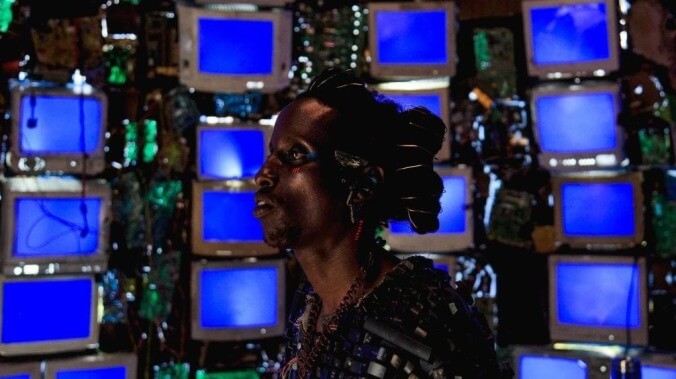Neptune Frost features bold colors—and bolder ideas
Co-directors Saul Williams and Anisia Uzeyman create a mesmerizing, metaphorical sci-fi musical

When a film includes characters named Memory, Psychology, Tekno, Elohel (that one took a minute), and then its heroes assume the handle of MartyrLoserKing, one should expect a story working in metaphor. Neptune Frost, written, composed, and co-directed by poet-musician Saul Williams and actress/director Anisia Uzeyman, is a low-budget science-fiction musical shot in Rwanda, set in an unknown time (“after the war”) and in an unknown place rich in minerals, slave labor, discarded technology, and some extraordinarily clever info crunch costumes. There’s little about it that is realistic, but it has points to make about the real world.
While the film is certainly engrossing, you should not expect action-adventure. It’s got more of a Godspell vibe, with its band of outsiders working toward change led by an intersex hacker called Neptune (played alternately by Elvis Ngabo and Cheryl Isheja) and Matalusa, a runaway miner whose brother (the aforementioned Tekno) was killed in the quarries for taking a moment to have an almost Uncut Gems-ish mind meld with a particularly inspiring hunk of coltan.
Neptune Frost’s plot, such as it is, is very much secondary to the theatrical vibe, and the beat-driven musical numbers. Most of the dialogue and lyrics are in Kinyarwanda, Kirundi, Swahili, and French, with the exception of a loud “Fuck you, Mr. Google!” in English. Even with subtitles, though, there’s some sci-fi speak among the story’s inhabitants, with unusual phrases like “shining” and “unanimous goldmine” working as greetings.
But for every typical adventure trope, like force fields appearing periodically as our characters are on the run, there’s an unfamiliar poli-sci element, like a spirit glowing under blacklight urging our heroes to “hack … hack into land rights and ownership … hack into business law, proprietorship … hack into the history of the bank … hack … and question the business of slavery, of free labor, its relation to today’s world.” Not since Zabriskie Point has psychedelia and Marxism worked together so effectively on screen.
 Keep scrolling for more great stories.
Keep scrolling for more great stories.
